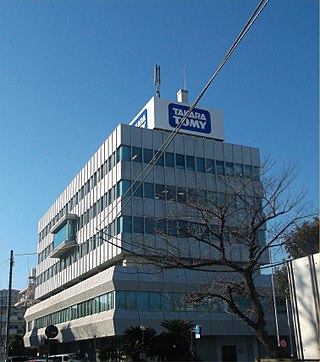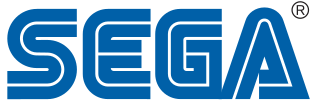
Data East Corporation, also abbreviated as DECO, was a Japanese video game, pinball and electronic engineering company. The company was in operation from 1976 to 2003, and released 150 video game titles. At one time, the company had annual sales of 20 billion yen in the United States alone but eventually went bankrupt. The American subsidiary, Data East USA, was headquartered in San Jose, California. Its main headquarters were located in Suginami, Tokyo.

Atlus Co., Ltd. is a Japanese video game developer, publisher, arcade manufacturer and distribution company based in Tokyo. A subsidiary of Sega, the company is known for video game series such as Megami Tensei, Persona, Etrian Odyssey, and Trauma Center, as well as Print Club (Purikura) arcade machines. Its corporate mascot is Jack Frost, a snowman-like character from their Shin Megami Tensei series. Outside of video games, the company is known for their Purikura arcade machines, which are selfie photo sticker booths popular in East Asia.

Sega Sammy Holdings Inc. is a Japanese global conglomerate formed from the merger of Sega and Sammy Corporation in 2004. Both companies are involved in the amusement industry.

Universal Entertainment Corporation, formerly known as Aruze Corporation and Universal, is a Japanese manufacturer of pachinko, slot machines, arcade games and other gaming products, and a publisher of video games. Aruze possesses licenses to both manufacture and distribute casino machines in the American states of Nevada, Mississippi and New Jersey. The company's corporate headquarters are in Tokyo. Aruze is also the licence holder of the video game franchise Shadow Hearts. Up until February 18, 2012, the company owned approximately 21% of Wynn Resorts. On November 1, 2009, Aruze Corporation changed its name to Universal Entertainment Corporation due to financial difficulties.
Natsume Atari Co., Ltd., formerly Natsume Co., Ltd. from 1987 to 2013, is a Japanese video game developer and publisher. Natsume Atari is based in Shinjuku, Tokyo, Japan and is known for developing licensed titles and mobile games.

Tokai Communications Corporation Inc is a telecommunications company in Japan providing DSL services and network solutions. Its headquarters are in the Tokai Building in Aoi-ku, Shizuoka, Shizuoka Prefecture. In North America, it is best known for its video games during the late 1980s and throughout the 1990s. In the US, they published games for the Nintendo Entertainment System, the Game Boy, the Super Nintendo Entertainment System, the Nintendo 64, the Sega Genesis, the Sega CD, the Sega Saturn, and the PlayStation.

Takara Co., Ltd. was a Japanese toy company founded in 1955. In March 2006, the company merged with Tomy Company, Ltd. to form Takara Tomy. The Takara motto was「遊びは文化」("playing is culture").

Sammy Corporation is a Japanese developer and retailer of pachinko and pachislot machines, headquartered in Shinagawa, Tokyo. Its South Korean office, Sammy Amusement Service, is headquartered in Seoul, South Korea. Sammy is a subsidiary of the entertainment conglomerate Sega Sammy Holdings.

AlphaDream Corporation, Ltd. was a Japanese video game development company founded in 2000 by Tetsuo Mizuno and Chihiro Fujioka in Tokyo, Japan. In partnership with Nintendo, it produced software for the Game Boy Color, Game Boy Advance, Nintendo DS, Nintendo 3DS, and Nintendo Switch, including the Mario & Luigi series. The company's staff included former developers from Square, such as Yoshihiko Maekawa. On October 1, 2019, AlphaDream was shut down after filing for bankruptcy, and on February 28, 2020, AlphaDream ceased to exist as a company.

Eizo Corporation is a Japanese visual technology company, founded in March 1968, which manufactures display products and other solutions for markets such as business, healthcare, graphics, air traffic control, and maritime. The company is headquartered in Hakusan, Ishikawa Prefecture.
Sun Corporation, operating under the name Sunsoft, is a Japanese video game developer and publisher.

AQ Interactive, Inc. was a Japanese video game developer and publisher. AQ stands for Artistic Quality. It was the parent company of the developers Artoon, Cavia and feelplus, and most recently the U.S. publisher Xseed Games. AQ Interactive and its subsidiaries produced games both under the AQ Interactive name, as well as developing for other publishers such as Microsoft Studios and Nintendo.

SETA Corporation was a Japanese computer gaming company, founded on October 1, 1985 and dissolved on February 9, 2009. SETA was headquartered in Kōtō, Tokyo, with a branch in Las Vegas, Nevada.

Marvelous Entertainment Inc. (MMV) was a multinational corporation that produced animation, music, video games and television series. MMV is known for its involvement in the Story of Seasons series. They merged with AQ Interactive in 2011 and became Marvelous AQL; the "AQL" was dropped later on.
Visco Corporation (株式会社ビスコ) is a software company located in Japan. It was founded in 1982 by Tetsuo Akiyama and later became corporate on August 8, 1983 while revealing itself as "Visco" in Japan. They originally developed video games for several platforms from the arcades and NES, to the Nintendo 64 and Neo Geo in the past. When Visco was one of the companies under the Taito umbrella, some of its titles back then were labeled "Taito". They also teamed up with Seta and Sammy in developing arcade games powered by the SSV arcade system board until Sammy fully acquired noted game company Sega under a new company titled Sega Sammy Holdings in 2004, while Seta's parent company Aruze announced in December 2008 that Seta decided to close their doors after 23 years of existence. Therefore, the SSV board was no longer being produced. From 2008, Visco began manufacturing slot machines for casinos mostly in southeast Asian regions.

iXIT Corporation, formerly known as Index Corporation, is a Japanese corporate information and communications technology company owned by Sawada Holdings.
Polygon Magic, Inc. is a Japanese video game developer. The company has been one of the largest studios in Japan. The company develops games for various platforms including arcade, Nintendo Wii, Nintendo DS, Nintendo 3DS, Facebook, Japanese SNS such as GREE and Mobage, and Pachinko. The studio is best known for Incredible Crisis and the Galerians series. The company has been a top developer and publisher for Japanese mobile social game field. Polygon Magic has been helping GREE to develop their first party titles. The company has its own social game platform, Porimaji Games.

This is a list of development studios owned by Sega, a Japanese video game developer and publisher based in Tokyo, Japan. Accompanied with the list is their history of game development. Also included are the companies that Sega has acquired over the years. For a full list of games developed and published by Sega, see List of Sega video games, List of Sega mobile games and List of Sega arcade games.
Kenzo Tsujimoto is a Japanese businessman who founded the video game companies Irem and Capcom. He has also served as president of Computer Software Copyright Association (ACCS) since 1997, and was president of Computer Entertainment Supplier's Association from 2002 to 2006.














